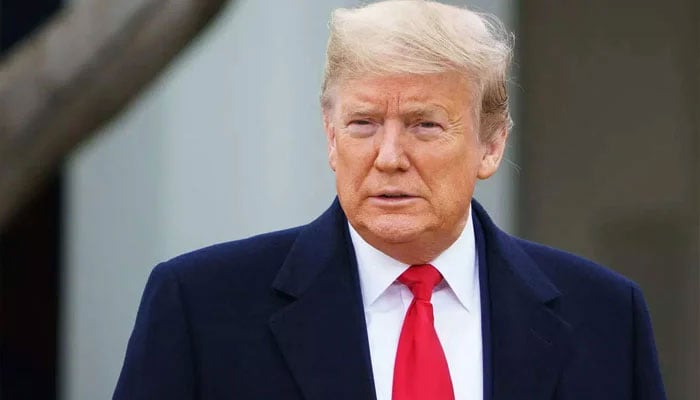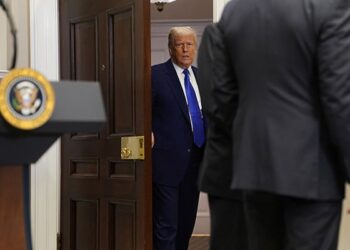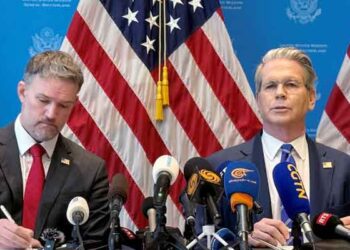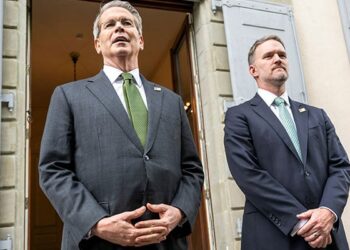Title: Trade Negotiations Between the U.S. and China Remain Stalled
Image Caption: U.S. President Donald Trump — Reuters/File
Washington, D.C. – President Trump has expressed his desire for a "fair" trade agreement with China, although the timeline for resolving the ongoing tariff standoff remains uncertain.
During a press conference in Washington on Wednesday, Trump confirmed that discussions with Beijing are actively taking place, indicating that a potential agreement might be within reach. However, senior U.S. officials did not provide specific details regarding the reduction of existing tariffs.
When questioned about the status of U.S.-China negotiations, Trump stated that the U.S. would secure a "fair deal," asserting that efforts to communicate with Beijing are consistent and ongoing. He noted that the timing for any tariff reductions "depends on them," referring to Chinese leaders. Despite these tensions, Trump maintained that he has a "good relationship" with Chinese President Xi Jinping and remains hopeful that an agreement can be achieved soon.
The trade conflict between the world’s two largest economies has intensified as Trump has increased tariffs on imports from China this year. This includes an additional 145 percent levy on numerous products, driven by grievances over practices deemed unfair and related issues.
China has responded with its own tariffs, imposing 125 percent duties on U.S. goods in retaliation.
While the U.S. appears to be striving for a fair resolution, the specifics of any ongoing negotiations continue to be unclear. When asked if there was direct communication regarding trade, Trump replied affirmatively, stating, "Every day."
Nonetheless, U.S. Treasury Secretary Scott Bessent indicated earlier on the same day that the two nations were "not yet" in discussions about lowering tariffs. He emphasized that both sides are likely waiting for the other to take the first step.
Bessent suggested that the exceptionally high tariffs enforced by both nations cannot remain in place indefinitely. "I don’t think either side believes that the current tariffs are sustainable, so I’m not surprised if they decrease mutually," he remarked during an event related to the International Monetary Fund and World Bank meetings in Washington.
He described the current situation as akin to an embargo, asserting that the breakdown of trade relations is counterproductive for both countries. While he noted the strong personal connection between Trump and Xi as a potential blessing, he added that any efforts to de-escalate tensions would not start at the top levels of government.
While Trump has implemented significant tariffs across various sectors and countries, he has also swiftly introduced exemptions for certain products—most recently providing temporary relief for technology items such as smartphones and semiconductor manufacturing equipment.
There are reports that he might further expand these exemptions, possibly including automotive components from tariffs on Chinese imports, in addition to those on steel and aluminum.
In a separate discussion on Wednesday, Trump stated he does not anticipate making changes to U.S. auto tariffs, though he did indicate that tariffs on vehicles imported from Canada could increase.
Bessent also refrained from issuing a clear opinion on whether Trump could dismiss Federal Reserve Chair Jerome Powell, referencing Trump’s earlier remark that the "termination" of Powell could not come soon enough, which he suggested may relate to the conclusion of Powell’s term rather than an immediate dismissal.
Earlier, Bessent pointed out that China’s economy, heavily reliant on exports, is "unsustainable" and detrimental to both China and the global economy. He reiterated U.S. concerns about trade imbalances that the Trump administration aims to address through extensive tariffs, while also emphasizing that "America first does not mean America alone." He argued that the administration’s approach seeks to encourage deeper collaboration and mutual respect among trade partners, while contesting policies from other nations that he believes have weakened U.S. manufacturing and compromised national security.






